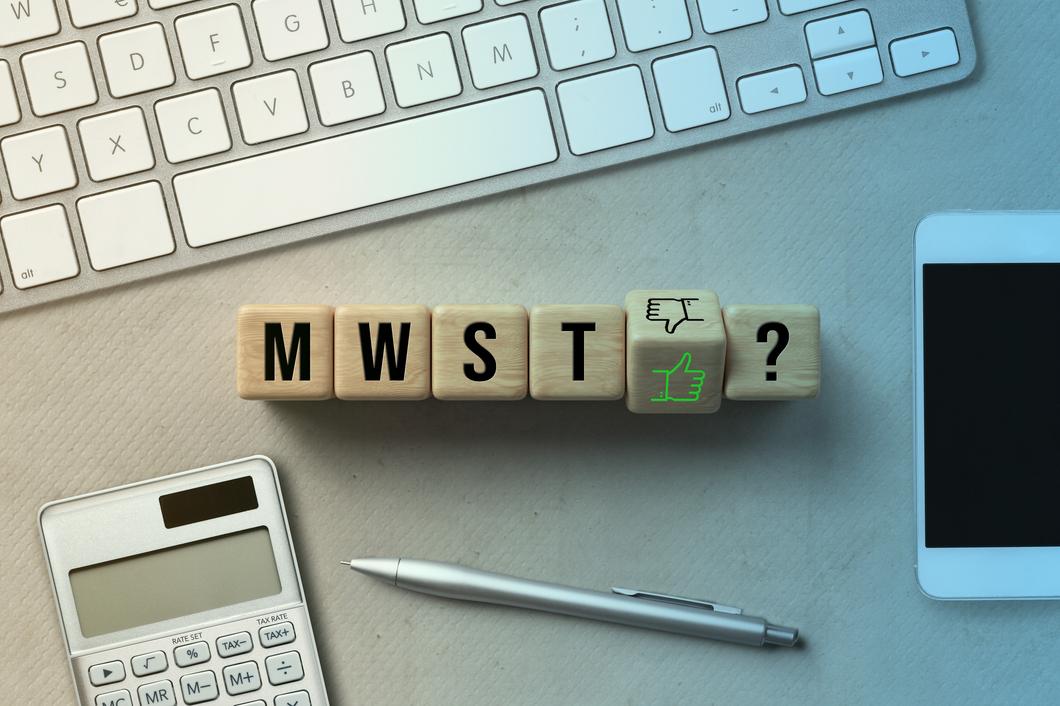28 November 2024
Partial revision of the Swiss VAT Act as per 1 January 2025 – changes at a glance

The new VAT Act and the new VAT Ordinance with accompanying regulations will come into force on 1 January 2025. The changes will affect specific sectors such as the travel industry, healthcare and investment foundations. However, cross-sector regulations such as the taxation of mail order platforms, the transfer of emission rights, live streaming and administrative changes are also in the spotlight. A brief overview of the most important regulations (non-exhaustive).
Radical revision of the net tax rate method (Saldosteuersatzmethode)
For taxpayers who settle their VAT using the net tax rate method, there are several changes. In particular, the new regulation regarding the change of accounting/declaration method will make the application of the net tax rate method more complicated. Previously, switching from the effective method to the net tax rate method and back generally did not lead to input VAT corrections on inventories and fixed assets. From 2025, the change of the declaration method will require a change in use, and therefore input VAT corrections (positive or negative input VAT adjustments) can result.
Among other changes, foreign taxpayers and electronic platforms will no longer be allowed to apply net tax rates.
New place of supply rule for streaming services
Virtual services in the fields of culture, art, sport, education, science, entertainment, and the like will be deemed to be supplied at the place where the recipient of the service is located, rather than where the activity is physically carried out. All live streaming events will be covered by the new rules and their place of supply, and thus, their taxability will have to be reassessed.
Transfer of emission allowances
The transfer of emission rights is vulnerable to VAT fraud. For this reason, the transfer of emission rights, emission reduction certificates and attestations, certificates of origin for electricity and similar rights will mandatorily be subject to the reverse charge mechanism, even if the seller is domiciled in Switzerland.
Taxation of mail order platforms
From 2025, turnover from the sale of goods via an electronic platform will, under certain conditions, be attributed to the platform for VAT purposes. Instead of a direct sale from the seller to the customer, a double sale from the seller to the platform and from the platform to the customer will be deemed to take place. As a result, the platform will have to pay VAT on the seller's sales to which it is not entitled under civil law. This new regulation has far-reaching consequences for electronic platforms and raises questions in terms of practical implementation.
For example, how can VAT compliant invoices be issued to the customer if there is no civil claim between the platform and the customer? How should these sales be accounted for? These questions similarly also arise for the seller. In the event of misconduct, the platform and mail order companies are now threatened with import bans or even the destruction of the goods without compensation. Ultimately, customers who purchase goods via a platform may also affected by the new rules, as the destroyed goods may already belong to them.
The new regulation on the taxation of mail order platforms has far-reaching consequences for sellers, platforms, and possibly, customers. These need to be analysed in advance; processes require to be adapted accordingly.
Information obligations for electronic platforms
While the taxation of mail order platforms described above will only apply to the sale of goods and not to the sale of services, the new information obligation is introduced for all online platforms. Upon request, all electronic platforms must inform the Swiss Federal Tax Administration (SFTA) of persons offering supplies to an extent that could trigger their VAT liability (annual turnover threshold of CHF 100,000). This will primarily also affect providers of transport services (taxis, courier services) and of accommodation services.
Taxation of travel agencies
Travel services resold by travel agencies and related services are no longer subject to Swiss VAT, even if the journey takes place in Switzerland. In this respect, domestic travel agencies benefit from a new VAT exemption. They are entitled to deduct input VAT if the resold travel services take place abroad.
Subsidies
If a public authority expressly designates the funds it makes available to the recipient as a subsidy or other contribution under public law, these funds are also deemed to be a subsidy or other contribution under public law for VAT purposes.
Other VAT exemptions
There will also be new VAT exemptions in the health sector and for services provided by investment foundations.
Annual filing of VAT returns
From 1 January 2025, taxable persons with an annual turnover of up to CHF 5,005,000 will have the option to submit their VAT returns annually (by the end of February of the following year). This applies to taxable persons who have regularly submitted their VAT returns on time and paid their VAT burden on time and in full. Annual filing can be applied for via the ePortal as of January 2025. Taxpayers who want to benefit from annual filing in 2025, need to submit their application by 28 February 2025 at the latest.
Taxpayers opting to annually reporting will have to pay VAT instalments during the year. The instalments are set by the SFTA with the taxpayer having the chance to adjust the amounts. The SFTA will revoke the annual filing if the taxpayer fails to submit the annual returns on time, fails to pay the VAT burden on time or in full, or over-reduces the instalments.
At first glance, the annual statement may seem to bring some administrative relief. On the other hand, quarterly filing always has the advantage that errors do not accumulate throughout the year but can be identified and corrected at an early stage. Whether annual VAT reporting will overall result in administrative relief will remain to be seen on a case-by-case basis. Furthermore, there is a risk with an annual filing that input VAT refund, resulting from e. g. import VAT on major purchases, are paid out annually, rather than on a quarterly basis. These negative cash flow impacts need to be assessed by businesses prior to changing their VAT reporting cycle. In addition, the VAT filing deadline may coincide closely with the closing of the financial statements.
Appointment of a fiscal representative at the discretion of the SFTA
From 2025, the SFTA can generally release foreign businesses from the obligation to appoint a local fiscal representative. According to the wording of the VAT law, this applies if the taxpayer 'otherwise complies with his procedural obligations'. This clause is not very specific, the conditions under which the SFTA will refrain from appointing a fiscal representative are not yet determined. The SFTA has not yet published a practice statement. However, VAT audits will continue to take place exclusively in Switzerland, i.e. taxpayers will still need to provide the SFTA with a Swiss address, at least for audit purposes.



